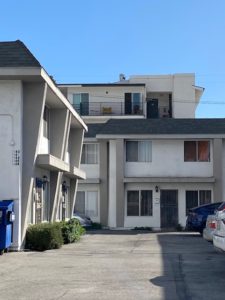
November 8, 2023
By the Building Equity and Transit Team
When you think about public health issues, rental housing may not be the first thing that comes to mind. But substandard conditions—when buildings are overcrowded, dilapidated, or infested with mold or pests—are a big obstacle to ensuring communities are safe, healthy, and able to thrive. Substandard housing conditions affect everyone: communities with substandard housing have higher rates of asthma and allergies, chronic sinusitis and skin diseases, bacterial and viral illnesses, and anxiety and other mental health conditions.
How Building Codes Help
To prevent substandard housing conditions, state and local governments set specific building code requirements for rental housing. For example, in Los Angeles, residential building codes and standards require that every rental unit has working heat, running water, proper ventilation, and smoke detectors. But these codes aren’t effective if they aren’t enforced, and lax inspections and improper enforcement can lead to catastrophic tragedies. In 2021, the Champlain Towers South collapse in Miami killed 98 people because of construction flaws. That incident prompted a review of hundreds of nearby high rises, many of which had serious maintenance issues for years that had not been addressed.
The City of Los Angeles has two mechanisms for ensuring rental properties are up to code. The Systematic Code Enforcement Program (SCEP) requires residential rental properties with two or more units be inspected every four years. Renters can also report problems directly to the Los Angeles Housing Department (LAHD). If the LAHD finds that there are code violations, they give the landlord a citation and a set amount of time to fix problems.
When Landlords Refuse to Fix
In the 1980s, under pressure from tenant advocates who were seeing landlords racking up citations but not being held accountable for fixes, Los Angeles established the Rent Escrow Account Program (REAP). Under REAP, landlords who do not address building code citations within the given amount of time may receive a Notice of Noncompliance from LAHD. Then, they have 15 days to appeal in order to comply, or their property is automatically placed into REAP.
Under REAP, rent money, which may be reduced, goes into an escrow account instead of directly to the landlord. The landlord or any of the tenants can apply to the escrow account’s manager for funds to fix violations in the building. The landlord must also pay fees to the city for noncompliance and may face criminal prosecution by the City Attorney if violations are severe enough.
In order for the building to be released from REAP, the landlord must make all necessary repairs, have an initial inspection with an outreach contractor, and then pass a final inspection by the city.
What You Can Do
- Familiarize yourself with your local residential building code requirements and understand your rights as a tenant to a safe and healthy home.
- If you do have habitability issues, document them! Take video and pictures. Write down the dates you asked the landlord to fix them.
- Alert the housing department if your landlord refuses to make necessary repairs.
- SAJE’s LA Tenant Action Center allows you to send a certified letter to your landlord about a repair a code problem
- In the City of Los Angeles, you can report code violations to the LA Housing Department here.
- In unincorporated Los Angeles County, building codes are enforced by two different agencies: the Department of Public Health (DPH) and the Department of Public Works (DPW). The DPH handles violations related to environmental conditions, such as inadequate sanitation, pest infestations, and leaky roofs. The DPW handles violations related to construction and zoning, such as unpermitted additions or changing a building’s use without getting the right permits.
- You can also apply for a rent reduction from DCBA using your inspection reports from DPH and DPW. In some cases, we’ve seen reductions up to 100%.
- Organize Your Neighbors
- Chances are if you are experiencing habitability issues, your neighbors are too. You are stronger together! Share your experiences with each other, document everything, and make a plan to address them collectively. And keep in mind that it’s illegal for your landlord to harass or retaliate against you for organizing!
- Join the fight for stronger code enforcement in Los Angeles County
- SAJE is pushing for an ordinance that, if passed, will establish a stronger inspection program and REAP for rentals in unincorporated Los Angeles County. To get involved in this campaign, email info@saje.net.

